沪教版高中英语一年级第一学期:Body language
- 格式:ppt
- 大小:5.80 MB
- 文档页数:40
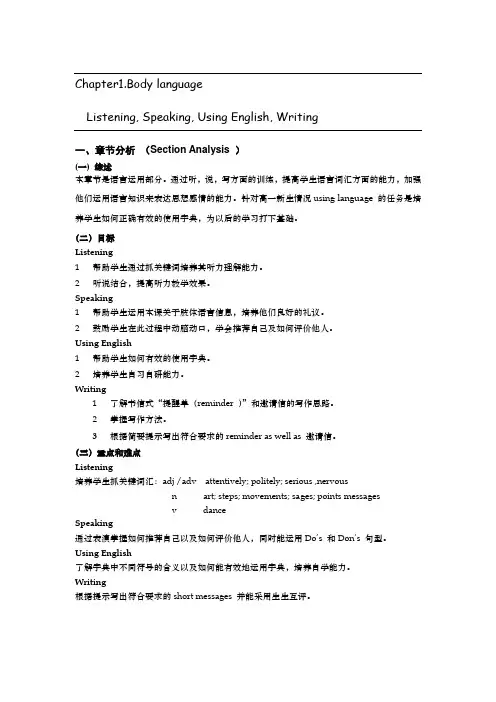
Chapter1.Body languageListening, Speaking, Using English, Writing一、章节分析(Section Analysis )(一)综述本章节是语言运用部分。
通过听,说,写方面的训练,提高学生语言词汇方面的能力,加强他们运用语言知识来表达思想感情的能力。
针对高一新生情况using language 的任务是培养学生如何正确有效的使用字典,为以后的学习打下基础。
(二)目标Listening1帮助学生通过抓关键词培养其听力理解能力。
2听说结合,提高听力教学效果。
Speaking1帮助学生运用本课关于肢体语言信息,培养他们良好的礼议。
2鼓励学生在此过程中动脑动口,学会推荐自己及如何评价他人。
Using English1帮助学生如何有效的使用字典。
2培养学生自习自研能力。
Writing1了解书信式“提醒单(reminder )”和邀请信的写作思路。
2掌握写作方法。
3根据简要提示写出符合要求的reminder as well as 邀请信。
(三)重点和难点Listening培养学生抓关键词汇:adj /adv attentively; politely; serious ,nervousn art; steps; movements; sages; points messagesv danceSpeaking通过表演掌握如何推荐自己以及如何评价他人,同时能运用Do’s 和Don’s 句型。
Using English了解字典中不同符号的含义以及如何能有效地运用字典,培养自学能力。
Writing根据提示写出符合要求的short messages 并能采用生生互评。
二、教学设计(Teaching Designs)Listening and speaking1Pre-speaking ---Warming upA short competition :Divide the class into two. Students are asked to answer thequestion: How should a person do during the interview ? Each side should follow the different patterns: Side A is required to begin with “He should…” , while Side B is required to begin with “ He shouldn’t …”Students take turns to answer the question. The side which goes to the last is the winner. (The content cannot be repeated )Example:Side A S1 : He should be polite .Side B S2 : He shouldn’t enter without knocking at th e door.Side A S2: He should sit straight .Side B S2: He shouldn’t brush his hair while answering the questions.教师先请两位学生示范,然后全班分两方进行比赛。
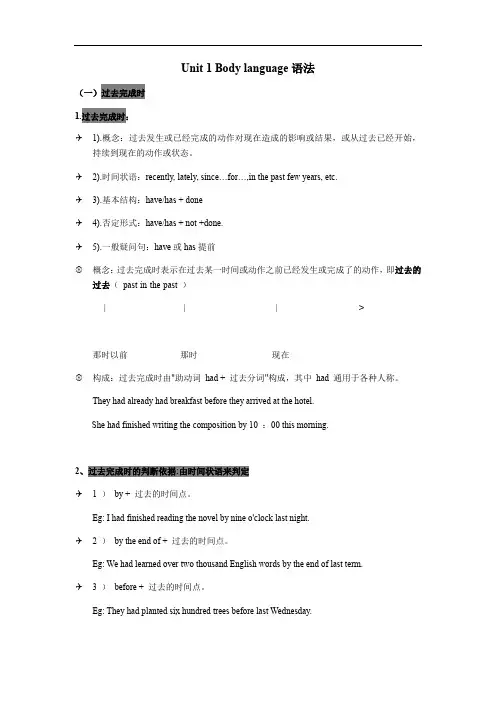
Unit 1 Body language语法(一)过去完成时1.过去完成时:✈1).概念:过去发生或已经完成的动作对现在造成的影响或结果,或从过去已经开始,持续到现在的动作或状态。
✈2).时间状语:recently, lately, since…for…,in the past few years, etc.✈3).基本结构:have/has + done✈4).否定形式:have/has + not +done.✈5).一般疑问句:have或has提前概念:过去完成时表示在过去某一时间或动作之前已经发生或完成了的动作,即过去的过去(past-in-the-past )----|-------------------------- |-------------------------------|---------------------------->那时以前那时现在构成:过去完成时由"助动词had + 过去分词"构成,其中had 通用于各种人称。
They had already had breakfast before they arrived at the hotel.She had finished writing the composition by 10 :00 this morning.2、过去完成时的判断依据:由时间状语来判定✈ 1 )by + 过去的时间点。
Eg: I had finished reading the novel by nine o'clock last night.✈ 2 )by the end of + 过去的时间点。
Eg: We had learned over two thousand English words by the end of last term.✈ 3 )before + 过去的时间点。
Eg: They had planted six hundred trees before last Wednesday.3.课堂练习:一.用动词的适当形式填空1. We _____________ (paint) the house before we ______________ (move) in.2. That rich old man _____________ (make) a will before he _____________ (die).3. They _____________ (study) the map of the country before they ________ (leave).4. The robbers _____________ (run away ) before the policemen_______ (arrive).5. I __________ (turn off) all the lights before I ____________ (go) to bed.6. Paul __________ (go) out with Jane after he __________ (make) a phone call.7. Tom __________ (say) he ___________ (read) the book twice.8. Our plan ____________ (fail ) because we _____________ (make) a bad mistake.9. When the chairman ______________ (finish) speaking, he _____________ (leave)the hall.10.The Reads __ ______ (have) lunch when I ________________(get) to their house.二.句型转换1.I had sold the ticket when she came.(改否定句)2.She had sung a song to us before she danced.(改否定句)3.They began to climb the mountain after they had bought all the food and drinks.(否定)4.By 10:00 a.m, I had been very hungry. (改一般疑问)5.Lucy had already completed the project when I arrived.(改一般疑问)6.By the time he got to the airport, the plane had taken off. (改一般疑问)7..He had broken his arm when I saw him.(对划线部分提问)8.When he had read the note, he ate it. (对划线部分提问)9..Jack didn’t go to the cinema because he had seen the film. (对划线部分提问)10.We had had the toys for ten years before we gave them to the child. (对划线部分提问)Keys:一、1. had painted... moved 2. had made ... died 3. had studied…left4. had run away..arrived5. had turned off …went 6. went …had made 7. said …had read 8 failed …had made 9. (had) finished …left 10. were having/had had …got二、1.I hadn't sold the ticket when she came.2. She hadn't sung a song to us before she danced.3. They didn't begin to climb the mountain after they had bought all the food and drinks.4. Had you been very hungry by 10:00 a.m?5. Had Lucy completed the project when I arrived yet?6. Had the plane taken off by the time he got to the airport?7. What had he done when you saw him?8.What did he do when he had read the note?9. Why didn't Jack go to the cinema?10. How long had you/we had the toys before you/we gave them to the child?(二)过去将来时:✈定义:它表示从过去某一时间来看将要发生的某个动作或存在的某种状态。
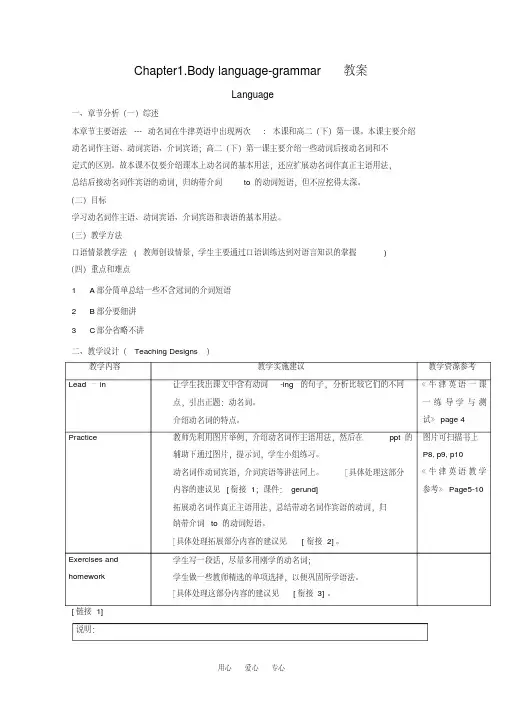
Chapter1.Body language-grammar教案Language一、章节分析(一)综述本章节主要语法---动名词在牛津英语中出现两次: 本课和高二(下)第一课。
本课主要介绍动名词作主语、动词宾语、介词宾语;高二(下)第一课主要介绍一些动词后接动名词和不定式的区别。
故本课不仅要介绍课本上动名词的基本用法,还应扩展动名词作真正主语用法,总结后接动名词作宾语的动词,归纳带介词to的动词短语,但不应挖得太深。
(二)目标学习动名词作主语、动词宾语、介词宾语和表语的基本用法。
(三)教学方法口语情景教学法( 教师创设情景,学生主要通过口语训练达到对语言知识的掌握)(四)重点和难点1A部分简单总结一些不含冠词的介词短语2B部分要细讲3C部分省略不讲二、教学设计(Teaching Designs)教学内容教学实施建议教学资源参考Lead –in 让学生找出课文中含有动词-ing的句子,分析比较它们的不同点,引出正题:动名词。
介绍动名词的特点。
《牛津英语一课一练导学与测试》page 4Practice 教师先利用图片举例,介绍动名词作主语用法,然后在ppt的辅助下通过图片,提示词,学生小组练习。
动名词作动词宾语,介词宾语等讲法同上。
[具体处理这部分内容的建议见[衔接1;课件:gerund]拓展动名词作真正主语用法,总结带动名词作宾语的动词,归纳带介词to的动词短语。
[具体处理拓展部分内容的建议见[衔接2]。
图片可扫描书上P8, p9, p10《牛津英语教学参考》Page5-10Exercises and homework学生写一段话,尽量多用刚学的动名词;学生做一些教师精选的单项选择,以便巩固所学语法。
[具体处理这部分内容的建议见[衔接3]。
[链接1] 说明:这是一份关于动名词的基础教学的教案与课件。
Step One lead-in1Ask students to find the sentences which have the form of v.+ing in the text .(possible answers):He gave an encouraging smile.Communicating is more than speaking and listening.She is holding her head up.2Explain the meaning and features of gerunds.Gerunds are –ing nouns. It is a kind of nouns. So in the above sentences, only“communicating, speaking, and listening” are gerunds. As a noun, gerunds canbe used as subject, verb object, preposition object, predicative and attributive. Step Two Presentation1Gerunds as subjects1)Example:T: What does shaking hands mean?S1: Shaking hands is a sign of friendship.S2: Shaking hands means that you are friendly.(动名词作主语时,位于动词用单数)2)PracticeStudents practise according to the example. They work in pairs. S1 makesquestions using the pictures and turning the verbs in brackets into –ing nouns. S2 chooses answers from the box.Shaking your fist is a sign of anger.Sighing is a sign of sadness.Yawning means that you are sleepy.Closing your eyes means that you are thinking.Whistling means that you are happy.Scratching your head means that you are thinking.Bowing is a sign of respect.(补充讲解句型It is (was) no use/good doing something.)2Gerund as verb objects1)Example:T: I didn’t know you could swim.S: Didn’t you? I love/ like swimming.T: So do I. I really enjoy swimming.I don’t. I hate / dislike swimming.I prefer walking.2)Practice:Students work in pairs to make similar dialogues about the pictures. Followthe example.3)Tell students some other verbs which have such usages.admit, appreciate, avoid, be worth, complete, finish, deny, delay, postpone,escape, practice, suggest, miss, allow, permit, forbid, consider, imagine3Gerunds after prepositionsOn her first day at work, Debbie saw the things. She didn’t know what they werefor, so she asked Mr Yang.Work in pairs to complete their conversation. S2 should answer S1, using –ing nouns made from the verbs in the box along with “for”.1)Example:T: Excuse me, but what are these _keys_____ for?S: They’re _for____ __locking_____ the drawers of the desk.2)Practice:Students work in pairs to make similar dialogues about the pictures. Followthe example.S1: And this _______?S2: It’s _______ ________ letters.S1: What about these _______ ________?S2: They’re _______ ________ your paper together.S1: This ________. What’s it for?S2: It’s _______ _______ the dates on documents.S1: And these ________?S2: They’re _______ ________. They’re a present for your first day at work.( 补充总结含介词to的动词短语:be (get)used to, get down to, look forward to, lead to, pay attention to, be devoted to, object to例如:Let’s get down to talking about your future.I’m look forward to hearing from you.)(见课件:gerund)[链接2]说明:这是动名词的拓展部分,拓展了动名词句型、接动名词做宾语的一些动词、接动名1下列句型后用动名词1)It’s no use / good doing…2)There is no point (in) doing …3)It’s worth doing…4)…can’t help doing…〖典型例句〗1)It’s no use crying over the spilt milk.2)The place is well worth visiting again.3)There is no point cheating in the exam.4)We can’t help laughing at the joke.5)It’s no good copying others’ homework.2下列动词后常接动名词做宾语1)admit, appreciate, avoid2)complete, consider3)delay, deny4)endure/stand, enjoy, escape, excuse5)finish6)imagine7)keep8)mind, miss9)postpone, practice10)resist, risk11)suggest巧记这些动词的诀窍:继续坚持勿停止;盼望完成莫推迟错过成功会后悔;惯于冒险须放弃避免原谅不逃脱;忙于欣赏禁不住介意练习很值得;考虑建议末延迟想象无用已无益;记得做过勿忘记禁止使用不定式〖典型例句〗1)I enjoy reading books in bed though it is not a good habit.2)I can’t imagine going to any place without you.3)Would you mind opening the door for me?4)He suggests reading English every day.5)The bird missed being shot.6)He escaped being punished by running away.3下列动词短语种to为介词1)be (get)used to2)get down to3)look forward to4)pay attention to5)be devoted to6)object to7)lead to〖典型例句〗1)I used to get up late, bu t now I’m used to getting up early.2)After discussing with his deskmate, he got down to writing his composition.3)I’m looking forward to hearing from you.以下几点可以在以后单元里讲解:1)need/ want / require 句型2)love, like, hate 后接 to do 与doing 作宾语的区别3)stop, remember, regret, try, mean, go on, forget后接 to do 与doing 作宾语的区別4)allow, permit, consider, advise后接 to do 与doing 作宾语和宾补的区别5)动名词的时态和语态6)动名词的复合结构[链接3]说明:Ⅰ单选:1.Do keeping _____, will you?A. to tryB. tryC. having triedD. trying2. We are all looking forward ______ Mr. Smith next week.A. to seeB. of seeingC. at seeingD. to seeing3. He spent all his time ______ for the final examination.A. to prepareB. of preparingC. in preparingD. to preparing4. The boy is only five years old, but he is quite used _____ the telephone.A. to answerB. to answeringC. of answeringD. by answering5. ______soundly is better for your illness than taking medicine.A. To sleepB. SleepingC. SleepD. Having slept6. Sometimes when I look into the sky, I feel like ______ a trip somewhere.A. to makeB. makingC. makeD. to go for7. I consider _____ of every fish is a kind of murder.A. takingB. a takingC. the takingD. to take8. My grandfather is a rich man, but ______ money does not solve all his problems.A. hasB. to haveC. havingD. having had9. It is no good ______ him to see you off.A. to expectB. expectingC. of expectingD. for him to expect10.There is one more book worth ______.A. readB. of readingC. being readD. reading11.He liked ______ many questions at the press conference.A. being askedB. askingC. of askingD. ask12.We had no trouble ______ the path through the forest.A. to findB. for findingC. findingD. with findingII.用括号里的动词的正确形式填空:1. He insisted on _______(do )the work in some other way.2. The windows want / need / require to be cleaned. That is, they need / want / require_____ (clean).3. He practiced _______(play) the piano every day.4. She doesn’t mind ______( work ) overtime.5. It will mean ______( benefit ) your company and mine.6. Have you decided to put off ______( go ) to the seaside?7. Peter kept (on) ______ (ask) questions.8. It’s a waste of time ______( argue) about it.9. _____ ( talk ) is easier than doing.10. Have you finished _______ (do) your homework?III.翻译:1. ______(每天晨读一刻钟)is very important in learning English.2. It’s no use _______(叹气).3. Debbie enjoys _______(微笑着与客户交流).4. John has just given up ______(吸烟).5. I ______(一直盼望着访问)China again.6. He run off to avoid ______(看见)by his class teacher.7. This machine is for ______(切纸).8. This book is well worth ______(读).9. ______(挥动拳头)is a sign of anger.10. Mr. Yang suggested/advised ______ (看着顾客的眼睛)to make a good impression on him.IV.拓展题:1.---You were brave enough to raise objections at the meeting.---Well, now I regret _____that.A. to doB. to be doingC. to have doneD. having done2.The patient was warned _____ oily food after the operation.A. to eat notB. eating notC. not to eatD. not eating3.She looks forward every spring to _____ the flower-lined garden.A. visitB. paying a visitC. walk inD. walking in4.The little time we have together we try _____ wisely.A. spending itB. to spend itC. to spendD. spending that5.While shopping, people sometimes can’t help ______ into buying something they don’t really need.A. to persuadeB. persuading D. being persuaded D. be persuaded6.What worried the child most was ______ to visit his mother in the hospital.A. his not allowingB. his not being allowedC. his being not allowedD. having not been allowed7.Tony was very unhappy for _____ to the party.A. having not been invitedB. not having invitedC. having not invitedD. not having been invited8._____ to sunlight for too much t ime will do harm to one’s skin.A. ExposedB. Having exposedC. Being exposedD. After being exposed9.The discovery of new evidence led to _____.A. the thief having caughtB. catch the thiefC. the thief being caughtD. the thief to be caught10.One learns a language by making mistakes and _____ them.A. correctB. correctingC. correctsD. to correct11.---You should have thanked her before you left.---I meant _____, but when I was leaving I couldn’t find her anywhere.A. to doB. toC. doingD. doing12.In some parts of London, missing a bus means_____ for another hour.A. waitingB. to waitC. waitD. to be waiting13.---What’s made John so angry?---______ the tickets for the concert.A. LoseB. To loseC. Because of losingD. Losing14. The day we are looking forward to _______ at last.A. arrivingB. arriveC. arrived D. arrives15. Mr. Reed made up his mind to devote all he had to ____ some schools for poor children.A. set upB. setting upC. have set upD. having set up附答案:Ⅰ.单选:DDCBBBCCBDBCⅡ.用括号里的动词的正确形式填空:doing, cleaning, playing, working, benefiting,going, asking, arguing, Talking, doing Ⅲ.翻译:1.Reading for a quarter of an hour every morning2.sighingmunicating with customers with a smile4.smoking5.am looking forward to visiting6.being seen7.cutting up paper8.reading9.Shaking one’s fist10.looking at customers’ eyesⅣ.拓展题:DCDBD BDCCB BADCB。
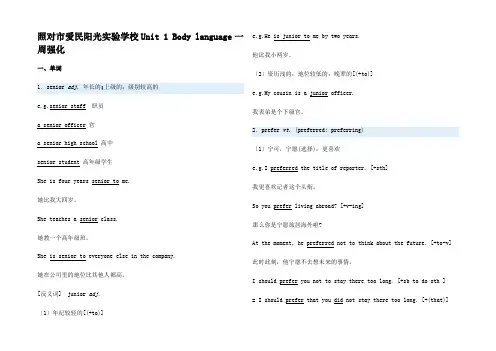
照对市爱民阳光实验学校Unit 1 Body language一周强化一、单词1.senior adj. 年长的;上级的;级别较高的e.g.senior staff 职员a senior officer 官a senior high school 高中senior student 高年级学生She is four years senior to me.她比我大四岁。
She teaches a senior class.她教一个高年级班。
She is senior to everyone else in the company.她在公司里的地位比其他人都高。
[反义词] junior adj.〔1〕年纪较轻的[(+to)]e.g.He is junior to me by two years.他比我小两岁。
〔2〕资历浅的;地位较低的;晚辈的[(+to)]e.g.My cousin is a junior officer.我表弟是个下级官。
2.prefer vt. (preferred; preferring)〔1〕宁可,宁愿(选择);更喜欢e.g.I preferred the title of reporter. [+sth]我更喜欢记者这个头衔。
So you prefer living abroad? [+v-ing]那么你是宁愿旅居海外啦?At the moment, he preferred not to think about the future. [+to-v]此时此刻,他宁愿不去想未来的事情。
I should prefer you not to stay there too long. [+sb to do sth ] = I should prefer that you did not stay there too long. [+(that)]我你不要在那儿呆得太久。
注意:prefer接从句时,从用虚拟语气。
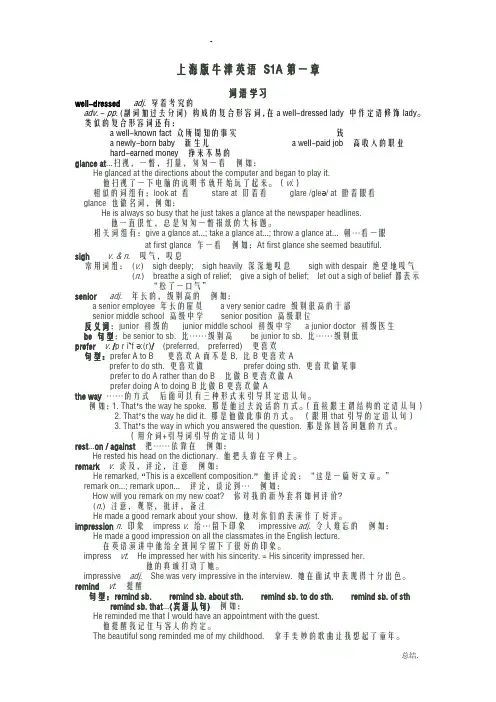
上海版牛津英语S1A第一章词语学习well-dressed adj. 穿着考究的adv. - pp. (副词加过去分词) 构成的复合形容词,在a well-dressed lady 中作定语修饰lady。
类似的复合形容词还有:a well-known fact 众所周知的事实a newly-born baby 新生儿hard-earned money 挣来不易的钱a well-paid job 高收入的职业glance at…扫视,一瞥,打量,匆匆一看例如:He glanced at the directions about the computer and began to play it.他扫视了一下电脑的说明书就开始玩了起来。
(vi.)相似的词组有:look at 看stare at 盯着看glare /gleə/ at 瞪着眼看glance 也做名词,例如:He is always so busy that he just takes a glance at the newspaper headlines.他一直很忙,总是匆匆一瞥报纸的大标题。
相关词组有:give a glance at…; take a glance at…; throw a glance at…朝…看一眼at first glance 乍一看例如:At first glance she seemed beautiful.sigh v. & n. 叹气,叹息常用词组:(v.) sigh deeply; sigh heavily 深深地叹息sigh with despair 绝望地叹气(n.) breathe a sigh of relief; give a sigh of belief; let out a sigh of belief都表示“松了一口气”senior adj. 年长的,级别高的例如:a senior employee年长的雇员 a very senior cadre 级别很高的干部senior middle school 高级中学senior position 高级职位反义词:junior 初级的junior middle school 初级中学 a junior doctor 初级医生be 句型:be senior to sb. 比……级别高be junior to sb. 比……级别低prefer v. /p r i`f ə:(r)/ (preferred, preferred) 更喜欢句型:prefer A to B 更喜欢A而不是B, 比B更喜欢Aprefer to do sth. 更喜欢做prefer doing sth. 更喜欢做某事prefer to do A rather than do B 比做B更喜欢做Aprefer doing A to doing B比做B更喜欢做Athe way ……的方式后面可以有三种形式来引导其定语从句。
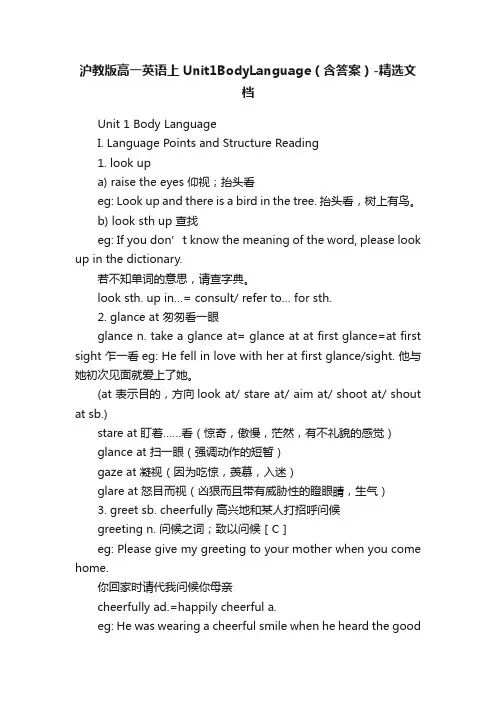
沪教版高一英语上Unit1BodyLanguage(含答案)-精选文档Unit 1 Body LanguageI. Language Points and Structure Reading1. look upa) raise the eyes 仰视;抬头看eg: Look up and there is a bird in the tree. 抬头看,树上有鸟。
b) look sth up 查找eg: If you don’t know the meaning of the word, please look up in the dictionary.若不知单词的意思,请查字典。
look sth. up in…= consult/ refer to… for sth.2. glance at 匆匆看一眼glance n. take a glance at= glance at at first glance=at first sight 乍一看eg: He fell in love with her at first glance/sight. 他与她初次见面就爱上了她。
(at 表示目的,方向look at/ stare at/ aim at/ shoot at/ shout at sb.)stare at 盯着……看(惊奇,傲慢,茫然,有不礼貌的感觉)glance at 扫一眼(强调动作的短暂)gaze at 凝视(因为吃惊,羡慕,入迷)glare at 怒目而视(凶狠而且带有威胁性的瞪眼睛,生气)3. greet sb. cheerfully 高兴地和某人打招呼问候greeting n. 问候之词;致以问候[C]eg: Please give my greeting to your mother when you come home.你回家时请代我问候你母亲cheerfully ad.=happily cheerful a.eg: He was wearing a cheerful smile when he heard the goodnews.当他听到这个好消息时,他面呈悦色cheer v. cheer sb. up 鼓舞,安慰/ 高兴起来eg: Cheer up! The news isn’t too bad. 振作吧!此消息没那么坏。
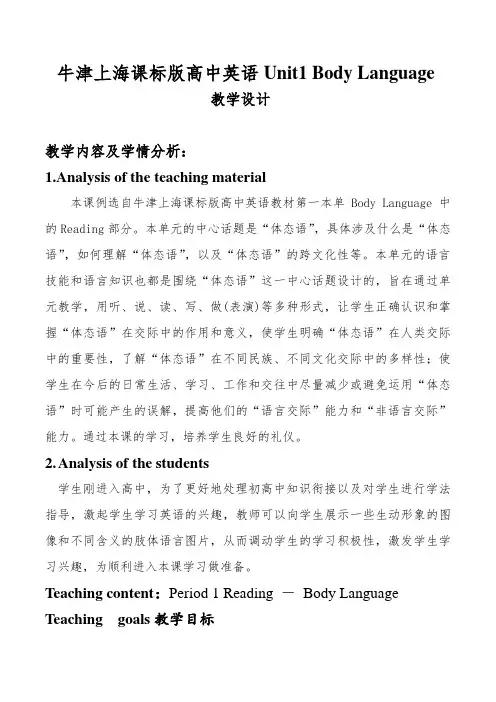
牛津上海课标版高中英语Unit1 Body Language教学设计教学内容及学情分析:1.Analysis of the teaching material本课例选自牛津上海课标版高中英语教材第一本单Body Language中的Reading部分。
本单元的中心话题是“体态语”,具体涉及什么是“体态语”,如何理解“体态语”,以及“体态语”的跨文化性等。
本单元的语言技能和语言知识也都是围绕“体态语”这一中心话题设计的,旨在通过单元教学,用听、说、读、写、做(表演)等多种形式,让学生正确认识和掌握“体态语”在交际中的作用和意义,使学生明确“体态语”在人类交际中的重要性,了解“体态语”在不同民族、不同文化交际中的多样性;使学生在今后的日常生活、学习、工作和交往中尽量减少或避免运用“体态语”时可能产生的误解,提高他们的“语言交际”能力和“非语言交际”能力。
通过本课的学习,培养学生良好的礼仪。
2.Analysis of the students学生刚进入高中,为了更好地处理初高中知识衔接以及对学生进行学法指导,激起学生学习英语的兴趣,教师可以向学生展示一些生动形象的图像和不同含义的肢体语言图片,从而调动学生的学习积极性,激发学生学习兴趣,为顺利进入本课学习做准备。
Teaching content:Period 1 Reading -Body Language Teaching goals教学目标1.Knowledge goals知识目标a.Master the key words and phrases:facial, communicate , expression,remind,remark,prefer,hesitation,gestureb.Master the sentences structures:①Act out the following actions, please.②Please show the actions, using body language.③Now it is your turn to show the action / gesture.2. Ability goals能力目标①Enable the students to understand body language.②Develop the students reading sills skimming, scanning and detailedreading③Enable the students to use body language in different situation.3.Emotional goals情感目标①Help the students learn how to express themselves in body languagewhen needed.②Help the students understand others when body language is beingused.③Enable the students to know the importance of body language andmean while develop good manners.Teaching key points:教学重点① Let students know the importance of body language.②Enable students how to use body language in the most appropriateoccasions.③Develop the students reading sills skimming, scanning and detailedreadingTeaching difficult points教学难点① Enable the students to realize the importance of body language incommunication②Let the students know what the passage mainly talk about. Teaching methods教学方法① Individual work, pair work and group work.②Skimming,Scanning Detailed reading.③Task-based teaching method; Role playing method.Teaching aids教具准备Multimedia computer, a projector , teaching planTeaching procedures & ways教学过程与方式1.Great the students (肢体语言)2.课前三分钟德育教育:安全教育(珍爱生命.预防溺水)新授:Step 1: Lead-in and Warming upUse the gesture(stand up&sit down) lead the body languageStep2:Do the guessing game1)Show some pictures about body language2) ask some students to guess the meaning3) Give the definition about Body LanguageStep3: Pre-readingTask1:Watch a short video and answer three questions;①How many people are there in the video? Who are they?②Where are Debbie and Simon?③What is the main topic of the story?Step 4: ReadingTask2: Skimming①What writing style(体裁) is this passage?②How should we read this passage?③Who gives Simon advice?Task3: Scanning-rankPut the sentences into order(d, b, g, a, h, e, c, )A.Mr Young said that bfody language is important.B.The lady walked over Debbie instead of Simon.C.Simon began to sit up and smile.D.a well-dressed lady entered the travel agency.E.Mr Young said that Debbie made others feel welcome.F.Simon's sister reminded him of her birthday.G.Simon walked over to the fax machine.H.Mr Young said that Simon looked downwards.Task4: Detailed reading1.Why did Simon not look happy?2.Why do people prefer to talk to Debbie?3.Why do people not go to Simon for assistance?4.What happened after Simon decided to sit up and smile at people?5.Who was the girl that walked over to Simon6.What are the three aspects of communication?Step5: Post readingTask5: List the body language between Debbie and Simon.Task6: DiscussionDiscussion about Debbie and Simon the effects who do you prefer different body language ?Why?Step6: Emotional EducationWhat is the best example of universal body language in the world ?Smile is a bridge to the world.Step7:Homework1.Finish C1 and C2 on P.4.2.If you were Simon, what would you change yourself?。
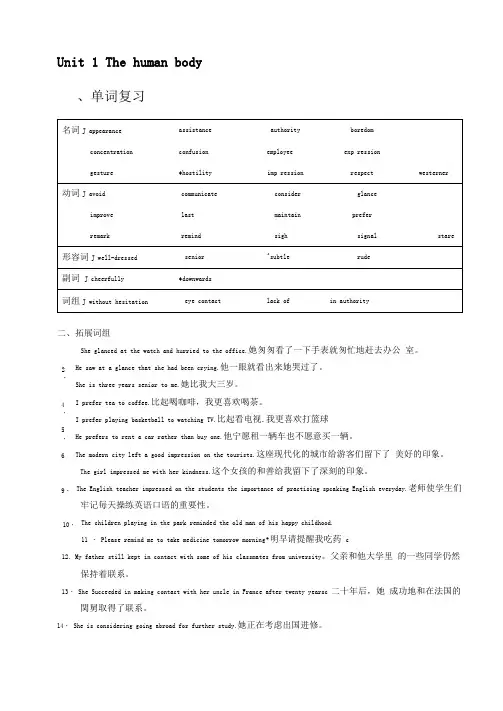
Unit 1 The human body 、单词复习二、拓展词组She glanced at the watch and hurried to the office.她匆匆看了一下手表就匆忙地赶去办公 室。
He saw at a glance that she had been crying.他一眼就看出来她哭过了。
She is three years senior to me.她比我大三岁。
I prefer tea to coffee.比起喝咖啡,我更喜欢喝茶。
I prefer playing basketball to watching TV.比起看电视.我更喜欢打篮球 He prefers to rent a car rather than buy one.他宁愿租一辆车也不愿意买一辆。
The modern city left a good impression on the tourists.这座现代化的城市给游客们留下了 美好的印象。
The girl impressed me with her kindness.这个女孩的和善给我留下了深刻的印象。
The English teacher impressed on the students the importance of practising spcaking English everyday.老师使学生们牢记毎天操练英语口语的重要性。
The children playing in the park reminded the old man of his happy childhood.11 ・ Please remind me to take medicine tomorrow morning •明早请提醒我吃药 c12. My father still kept in contact with some of his classmates from university 。
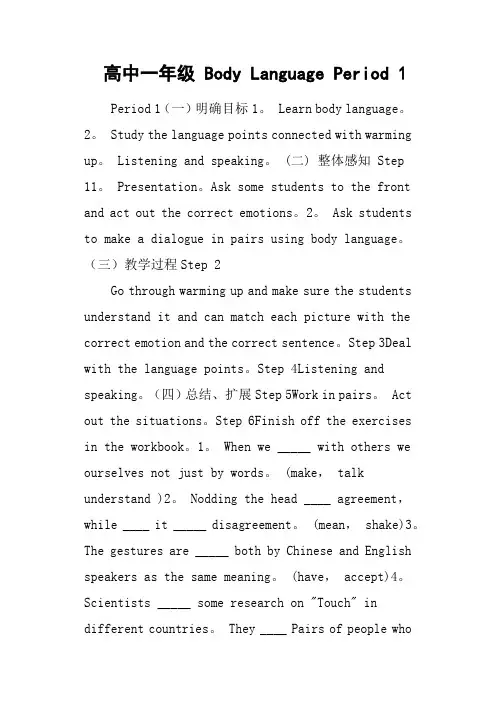
高中一年级 Body Language Period 1 Period 1(一)明确目标1。
Learn body language。
2。
Study the language points connected with warming up。
Listening and speaking。
(二) 整体感知 Step 11。
Presentation。
Ask some students to the front and act out the correct emotions。
2。
Ask students to make a dialogue in pairs using body language。
(三)教学过程Step 2Go through warming up and make sure the students understand it and can match each picture with the correct emotion and the correct sentence。
Step 3Deal with the language points。
Step 4Listening and speaking。
(四)总结、扩展Step 5Work in pairs。
Act out the situations。
Step 6Finish off the exercises in the workbook。
1。
When we _____ with others we ourselves not just by words。
(make, talk understand )2。
Nodding the head ____ agreement,while ____ it _____ disagreement。
(mean, shake)3。
The gestures are _____ both by Chinese and English speakers as the same meaning。